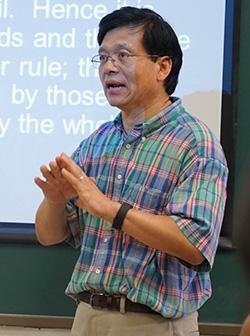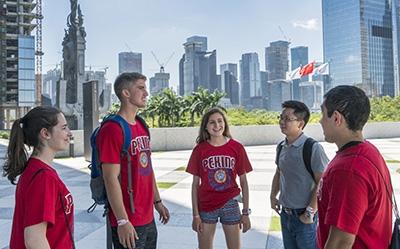
During a sunrise run in China’s remote Gansu Province last summer, Sam Rasmussen ’19 felt he was traveling back in time to China as it looked decades ago. He jogged on unpaved roads through desert terrain, past homes made of adobe and farmers working in their fields. When he needed a pit stop, a farmer led Rasmussen behind his house to a concrete slab over two holes in the ground.
It was a stark contrast to the bustling city of Beijing, where he had spent most of the previous four weeks. “It’s so busy and chaotic in Beijing. I love the energy,” said Rasmussen. “But it was amazing to go out to these rural regions and meet people who live entirely differently.”
Rasmussen was one of 15 Princeton undergraduates on a six-week Global Seminar to explore contemporary Chinese society, including its burgeoning diversity, rapid change, growing rural-urban divide, and increasing wealth and social disparities.
An Objective Perspective

“One cannot really understand what’s going on in China without spending time there,” said Yu Xie, the director of Princeton’s Center on Contemporary China, who led the seminar.
Xie, Princeton’s Bert G. Kerstetter ’66 University Professor of Sociology and the Princeton Institute for International and Regional Studies, wanted the students to view the country “from a Chinese perspective, not from an American perspective” and see China “as it is rather than as they think it should be,” he said. Helping them do that were 12 Peking University undergraduates who joined the Princeton students for the seminar.
During class time at Peking University in Beijing, the students studied the language and discussed China’s history and economy, gender and family, poverty, and entrepreneurship, among other topics. They took a number of trips, including to a government agency, a hospital, and a cram school (where students prepare for college entrance exams), enabling them to examine different aspects of society up close.
“I learned a lot just eating lunch with the Chinese students, talking with them about their dreams, their pasts, their futures, and what they viewed as important in life,” said Rasmussen, who had previously spent two years in Taiwan and speaks Mandarin.

For Calvin Yu ’19, whose parents are from China, the seminar provided a chance to examine how China is influencing the rest of the world. He was struck by the economically robust Shenzhen, a modern and booming metropolis near Hong Kong, that he compared to Silicon Valley, with skyscrapers and gleaming buildings.
Yu’s first impression: “It doesn’t look like China.” They visited the Shenzhen Stock Exchange and toured Tencent, an innovative technology and Internet company that created the popular app WeChat.
Challenging a Western Narrative
Touring Tencent and listening to the seminar’s guest speakers—among them scholars and businesspeople, including James Mi *91, co-founder and managing director of the venture capital firm Lightspeed China Partners—altered Rasmussen’s view of China.
Many of the speakers had either been raised in the US or gone to school in the US, but were now living in China, explained Rasmussen. “They saw it as a place with more opportunity than the United States, which challenged my nationalistic idea that America is the land of opportunity,” he said. “I came to see China as this exciting innovative frontier. I could certainly see myself living and working there.”
As for the seminar, “it changed my idea of learning about China from something you check off to a lifelong process.”
To learn more about supporting global seminars at Princeton, contact Niki Emanuel, associate director of leadership gifts, at ndemanuel@princeton.edu or 609.258.3314. For information about supporting the Center for Contemporary China, contact Kerstin Larsen ’83 *17, assistant vice president for development/fundraising initiatives, at klarsen@princeton.edu or 609.258.8972.


